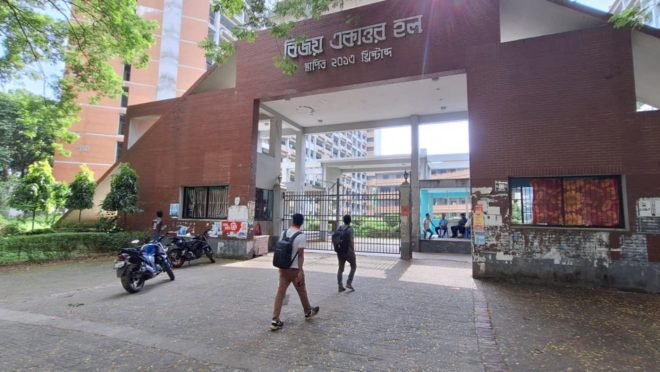Abolished, but at what cost? The fight for safer campuses after gono rooms
Abolished, but at what cost? The fight for safer campuses after gono rooms

Shihab, a young student from Noakhali stepped into Dhaka University in 2019. “I came here with a heart filled with pure intentions and a myriad of expectations. But, it took me only a few days to see my dreams being shattered. I am from a struggling financial background, so I had to manage a seat in the dorm…politically”, Shihab lamented.
“Getting a seat in the dorm was my fundamental right but I had to request political leaders of the then ruling party’s student wing BCL (Bangladesh Chhatra League) to secure me a place to sleep. Yes, they did me a favour by managing a corner in a tiny room aka ‘Gono room’ (a room for the freshers) with 11 other unfortunates like me.
I had to show gratitude by attending their programmes every other day, taking part in procession instead of going to class, chanting slogans against my willingness, and getting rebuked by seniors in the ‘Guestroom’ (a culture initiated by BCL members to torture students mentally and physically) because one of us didn’t notice a political leader while running for the class and violated the law by not conveying him salam. So, we had to go through ‘Manners’ lessons quite often taught by the seniors who’d not utter a single line without cursing. “Ironic!”- Shihab sighs.
The story above is a compilation of events I learned from my friends and peers during the early days of my university. I couldn’t find a clue why this system had been running for so long and why everyone accepted it.
Soon, I found out there was no other way rather than being silent and being grateful to the political leaders because they showed generosity by providing shelter. Thousands of students went through the vicious cycle of student politics and dreams were ruined at the root.
Luckily, the scenario changed after the toppling of the dictatorial Bangladesh Awami League regime. ‘Gono rooms’ have been abolished, ‘Guest room’ culture has been swept away and the BCL has been banned. Students are no longer forced to take part in political programmes.
However, skepticism remains despite most of the universities banning political practice on the campuses. Students are yet to be assured whether they’d be used for political purposes again, they want their life to be secured along with an uninterrupted academic calendar. On the contrary, there is an ongoing discussion on how leaders will emerge without political activities. Conventionally most of the leaders of our country came through student politics.
‘July Revolution’ provided students with fresh hope for a Bangladesh 2.0 free from outdated conventions. Apparently, there is an outcry for remodeling campus politics. Student-led new political parties are showing up with newer promises. Older ones are trying to revamp their policies and practices to attain sustainability.
But, it’s saddening to witness a clash in February that took place in KUET (Khulna University of Engineering and Technology) injuring around 40 students. Jatiya Chhatradal (JCD), the student wing of BNP, and the Students Against Discrimination (SAD) blamed each other for the mayhem.
The university was shut down for an indefinite period to normalise the situation. After a few days, there was a clash between private and public university students while declaring leading members of a new student-led political group. The incidents took place at the Dhaka University campus where private university students were demanding their stake in the group.
These incidents take us back to square one where student politics was a display of clashes and casualties demonstrating power hunger. The political parties should step out of power-centric politics and replace it with student-centric politics.
Ironically enough, this very fundamental aspect has been a long-lost story in the arena. The parties should allow dissent without throttling voices. They should have all due honesty to fight criticism and be open to feedback. Concentrating on ‘student’s well-being’ and being a ‘voice of the students’ will earn them the respect that the banned students’ organisation BCL couldn’t get despite providing hour-long ‘Manners’ sessions.
Parallely, the university authorities should keep a keen eye on tracking the activities of the parties and arrange students’ representative elections to play a key role in creating future leaders for the country. It’s high time they figured out how to ensure a disruption-free academic schedule aligning with political activities. Campus closure due to political disputes shouldn’t continue to become headlines anymore.
Sources:
- The Daily Star (2023). Clash at Kuet: Jubo Dal leader expelled after brandishing sharp weapon. Retrieved from:
https://www.thedailystar.net/news/bangladesh/crime-justice/news/clash-kuet-jubo-dal-leader-expelled-after-brandishing-sharp-weapon-3828186 - BBC NEWS বাংলা (2025). নতুন ছাত্র সংগঠন ঘিরে যা ঘটলো ঢাকা বিশ্ববিদ্যালয়ে. Retrieved from:
https://www.bbc.com/bengali/articles/cn0j17901nno


